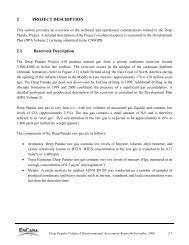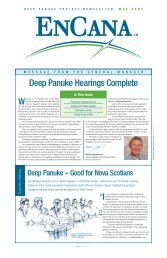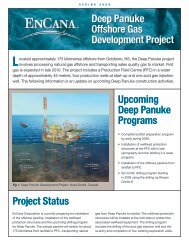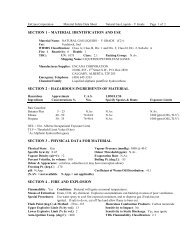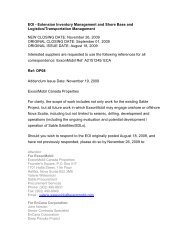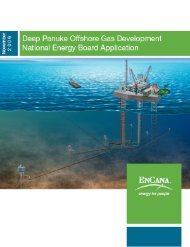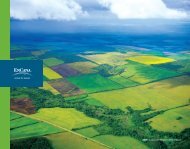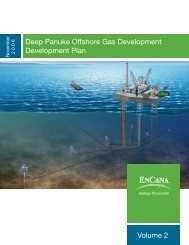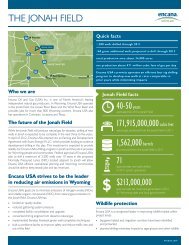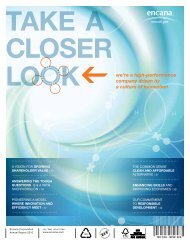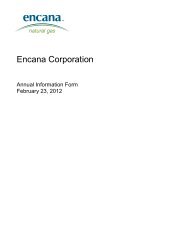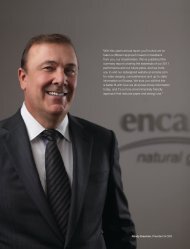Deep Panuke newsletter - Encana
Deep Panuke newsletter - Encana
Deep Panuke newsletter - Encana
Create successful ePaper yourself
Turn your PDF publications into a flip-book with our unique Google optimized e-Paper software.
D E E P P A N U K E P R O J E C T N E W S L E T T E R<br />
Research and development<br />
Tracking the tides<br />
<strong>Deep</strong> <strong>Panuke</strong> project<br />
<strong>Encana</strong> people<br />
PHOTO: ENCANA PHOTO: PROVINCE OF NOVA SCOTIA<br />
Cape Split on the Bay of Fundy, NS. The Bay of Fundy is home to the world’s highest tides.<br />
Developing tidal energy in<br />
the powerful waters of<br />
Nova Scotia’s Bay of Fundy<br />
requires innovative thinking, creative<br />
partnerships and cutting edge<br />
research and development.<br />
As part of our commitment to<br />
Nova Scotia, where <strong>Encana</strong> is the<br />
owner and operator of the <strong>Deep</strong><br />
<strong>Panuke</strong> offshore natural gas project,<br />
we are pleased to partner with the<br />
Fundy Ocean Research Center<br />
for Energy (FORCE) to support a<br />
research monitoring platform for tidal<br />
energy in the province.<br />
<strong>Encana</strong> is directing $3 million<br />
in funding to the platform by<br />
converting a zero interest loan from<br />
our Environmental Innovation Fund<br />
to a grant.<br />
The new platform will contribute<br />
to better understanding of the tides<br />
in the Bay of Fundy, which has<br />
Education and training<br />
Talking about<br />
Techsploration<br />
Earlier this year Christina Clarke (r), an <strong>Encana</strong> loss control engineer and a Techsploration<br />
program mentor, took six students from Prince Arthur Junior High School in Dartmouth, NS—<br />
a school she herself attended—on a tour of the offshore supply base that supports the <strong>Deep</strong><br />
<strong>Panuke</strong> project in Nova Scotia. Hailey Thomas (l) was one of the students. “Techsploration is<br />
a great way to expose young women to careers they might not have considered otherwise,”<br />
says Christina. “It wasn’t until after my first year of university that I even considered<br />
engineering, and I think that’s simply because I didn’t know enough about it. My hope is that<br />
making students aware of different options will help them with career decisions later on.”<br />
It’s no secret women are vastly<br />
under-represented in careers in the<br />
sciences, trades and technology—<br />
backgrounds that are key to work in<br />
the offshore oil and gas industry. But<br />
Techsploration is looking to change that.<br />
<strong>Encana</strong> has long supported<br />
Techsploration, a program in Nova<br />
been earmarked as a testing site<br />
for electricity generating underwater<br />
turbines. Bay of Fundy tides are the<br />
highest in the world. The underwater<br />
platform will be the world’s first<br />
deployed in extreme, high flow<br />
conditions like those in the Bay of<br />
Fundy. Good resource information<br />
translates into good turbine<br />
design—the platform will collect<br />
continuous data on the tides and<br />
surrounding environment and relay<br />
that information to the nearby tidal<br />
observation facility on the outskirts<br />
of Parrsboro, NS.<br />
Other partners in the exciting<br />
research include the Government of<br />
Canada, Ocean Networks Canada<br />
and the turbine developers who<br />
are working to harness the power<br />
of the tides.<br />
To learn more, visit FORCE at<br />
www.fundyforce.ca.<br />
Scotia that encourages female students<br />
in Grades 9 through 12 to explore<br />
careers in sciences, trades and<br />
technology. The Techsploration program<br />
showcases potential careers, and<br />
stresses the importance of high school<br />
math as a strong foundation for work<br />
in many technical fields. <strong>Encana</strong>’s<br />
Bruce Pulsifer, Lead Materials Engineer<br />
If you want to know what <strong>Deep</strong> <strong>Panuke</strong> is made of,<br />
talk to Bruce Pulsifer. He is the project’s lead materials<br />
engineer.<br />
In Bruce’s job, he assesses the materials<br />
used in all aspects of <strong>Deep</strong> <strong>Panuke</strong>—from perfs to<br />
processing to point-of-sale.<br />
One example of Bruce’s work was helping to<br />
determine what the project’s flowlines needed to be<br />
made from. There are four production flowlines at<br />
<strong>Deep</strong> <strong>Panuke</strong>, each transporting natural gas from a<br />
well to the offshore platform for treatment.<br />
Because the natural gas at <strong>Deep</strong> <strong>Panuke</strong> is<br />
under pressure and sour (meaning that it contains hydrogen sulphide), extra care was needed<br />
to prevent cracking and corrosion by selecting the right materials to build the flowlines. The<br />
solution: flowlines made with Incoloy 825 cladding, a corrosion resistant alloy.<br />
Bruce hails from Middle Musquodoboit, NS where he lived briefly on a dairy farm before<br />
moving to Dartmouth. He is a graduate of the engineering school at Dalhousie University,<br />
receiving his Bachelor and Master degrees in metallurgical engineering—the study of metals<br />
and alloys and how they can be used reliably and economically in industrial applications.<br />
As an Accredited Materials Selection Specialist with the National Association of Corrosion<br />
Engineers, Bruce combines extensive experience with his unique training in applying the<br />
principles of materials selection.<br />
Following graduation from engineering school, Bruce worked in the oil and gas industry<br />
onshore in Western Canada for about a decade. He has worked in the offshore oil and gas<br />
industry for more than 20 years, with experience on projects in Indonesia and the Persian Gulf.<br />
In 2006, he jumped at the chance to work on the <strong>Deep</strong> <strong>Panuke</strong> project. “A great group<br />
of diverse professionals has been assembled for the <strong>Deep</strong> <strong>Panuke</strong> team,” says Bruce. “I’m<br />
pleased to contribute to the team.”<br />
For those considering a career in the offshore oil and gas industry, Bruce offers the<br />
following advice: “On an offshore project like <strong>Deep</strong> <strong>Panuke</strong>, contributing and learning are the most<br />
gratifying aspects. And any day when you can learn something new, then that’s a good day!”<br />
Engineering at <strong>Encana</strong> is a natural fit for the Pulsifer family. Bruce’s son works as an<br />
engineer at the <strong>Encana</strong> head office in Calgary, Alberta.<br />
Bruce and family are planning another rendezvous “down south” later this year. Having<br />
spent more than a dozen winters in sunny climates, it’s a tradition that’s easy to warm up to!<br />
Bruce Pulsifer at the <strong>Deep</strong> <strong>Panuke</strong> pipeyard, Sheet Harbour, NS. These sections of pipe<br />
became flowlines at <strong>Deep</strong> <strong>Panuke</strong> that will transport natural gas from the wells to the<br />
production platform.<br />
support for Techsploration has<br />
included financial contributions,<br />
volunteer mentoring and in-kind<br />
donations.<br />
In 2009 <strong>Encana</strong> stepped up<br />
support for Techsploration by<br />
funding the development of the<br />
Women in Action web video series.<br />
These testimonial videos feature<br />
women in careers typically underrepresented<br />
by women, from power<br />
engineering to pipefitting. <strong>Encana</strong><br />
engineer and former Techsploration<br />
mentor Cindy MacDonnell is one<br />
of the 28 women currently profiled<br />
in the series.<br />
But there is more on the<br />
way. Expanded funding from<br />
<strong>Encana</strong> will see nine new videos<br />
added—three per year for the<br />
next three years. The new videos<br />
focus on offshore-related careers.<br />
To start, videos of a tugboat captain,<br />
an offshore surveyor and a helicopter<br />
mechanic will be added to the<br />
series in 2012.<br />
The videos have received<br />
more than 38,000 hits from around<br />
the world, and are being picked<br />
up in classrooms across Canada.<br />
The Nova Scotia Department of<br />
Labour and Advanced Education has<br />
asked to include the videos in their<br />
occupational profiles on the<br />
careers.novascotia.ca website.<br />
The videos can be viewed via<br />
Techsploration’s YouTube channel at<br />
www.youtube.com/techsploration<br />
or the Techsploration website at<br />
www.techsploration.ca.<br />
PHOTOS: DAVE NICHOLS, PRISMA PRODUCTIONS<br />
S E P T E M B E R 2 0 1 2



